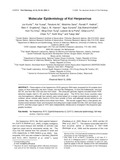Molecular epidemiology of koi herpesvirus
Share
Abstract
Three regions of koi herpesvirus (KHV) genomic DNA were compared for 34 samples from Japan, six from Indonesia, two from Taiwan, one from the Philippines, 13 from the Netherlands, one from the UK, one from the USA and one from Israel. The analyzed genomic regions included known PCR-detection targets (SphI-5, 9/5 and the thymidine kinase gene). The KHVs from Asian countries were very homogeneous, although two variants were noted based on a single nucleotide polymorphism. In contrast, seven variants were found in KHVs from outside of Asia, and although closely related to one another, they were clearly distinct from those from Asian. The results suggest that a clear genetic distinction exists between Asian and European (including each single isolate from the USA and Israel) types of KHV, and that unique types of KHV were independently introduced or emerged in the respective geographic locations.
Suggested Citation
Kurita, J., Yuasa, K., Ito, T., Sano, M., Hedrick, R. P., Engelsma, M. Y., Haenen, O. L. M., Sunarto, A., Kholidin, E. B., Chou, H.-Y., Tung, M.-C., de la Peña, L. D., Lio-Po, G., Tu, C., Way, K., & Iida, T. (2009). Molecular epidemiology of koi herpesvirus. Fish Pathology , 44(2), 59-66. https://doi.org/10.3147/jsfp.44.59
Subject
Collections
- AQD Journal Articles [1249]

